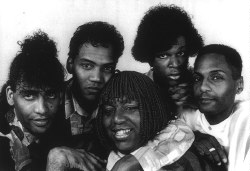
Starting May 27, Gainan Fini will be playing at Teatro Luna Blou in Curacao. Gainan Fini is a Caribbean La Cage aux Folles. I know a lot of so called 'straight acting' gay man on the island will feel the need to keep on stating that they're not like that. That they're not 'women 'and will complain about the fact that only effeminate gay men get public space in the Curacao popular culture. It is true, that in popular culture there is 'space' for men to be homosexual if they act (and sometimes dress) in a feminine way. But it's also true that most 'normal' gay men wouldn't dare to go public with their sexuality. It's always the same discussion. It also happened in New York during the so called Stonewall Riots. The men that could pass for straight did that and blended in the crowd, and the transvestites stood there and fought with the police.
 The same five courageous guys from Antillean descent did when they told their own story in the documentary Marival, by Felix the Rooy. At a viewing of the documentary in Rotterdam, again someone in the audience made the remark about this portrayal of gay men. The filmmaker De Rooy was present and remarked correctly that those guys were ready to tell their story in front of the camera, something most other wouldn’t.
The same five courageous guys from Antillean descent did when they told their own story in the documentary Marival, by Felix the Rooy. At a viewing of the documentary in Rotterdam, again someone in the audience made the remark about this portrayal of gay men. The filmmaker De Rooy was present and remarked correctly that those guys were ready to tell their story in front of the camera, something most other wouldn’t.
Gainan Fini will be entertainment making fun of transvestites, but also a stage for some transvestites on the island to express themselves. I would go if I was on the island.
I must confess that another reason to publish about this play is the fact that my friend Vincent designed the poster, which I found very good!
Gainan Fini:
Gainan fini di Eligio Melfor ta e vershon di 'cage aux Folles' di Kòrsou. Den e komedia sumamente humorístiko aki, e mayornan di e pareha ku ta bai kasa, mester bin huntu pa sera konosí. Komo tata di e brùit ta un funshonario públiko di gobièrnu di masha haltu kategoria i kontakto, nan no por pèrmití, pa e haña sa ku e yònkuman ku ta bai kasa ku su yu muhé, su mayornan ta un pareha hòmber homoseksual. Pa e motibu aki un di nan dos mester bisti na muhé pa hunga ròl di mama. Aki tur e situashon di hilaridat ta kuminsá. Un komedia ku bo no por pèrdè.